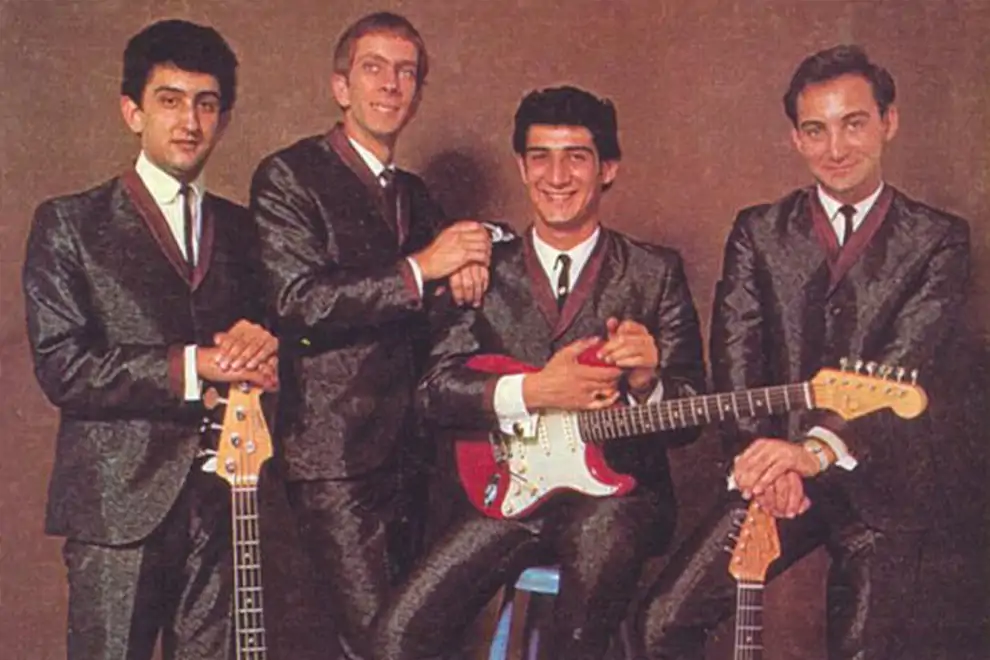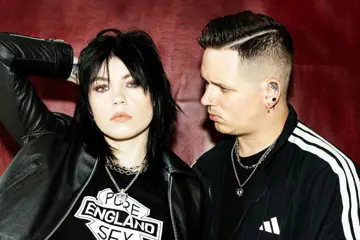Guitarist Jim Skiathitis thought it was just another song until Peter Hood added his drums. Then they played it for their A&R man, Sven Libaek, at CBS Records. He flipped. “That’s it, that’s it,” he exclaimed. “This is the hit!”
“Australia didn’t know what had hit it,” observed critic Clinton Walker. “Something like the future. This was the point at which Australian pop, Australian songwriting, caught up with the rest of the world.”
Bombora is an Aboriginal term for waves breaking over submerged rocks. And Bombora, the song, simulates the rush of riding a massive wave.
The Atlantics rode that wave all the way to the top of the Australian charts and Bombora was released around the world, being named Record of the Week in Cashbox magazine in the US, and reaching the Top 10 in Italy, where it was so big, an Italian version – complete with vocals – was released.
It was the first international hit by an Australian band.
Sixty years ago, surf music was all the rage. 1963 started with The Denvermen on top of the charts with the surf ballad Surfside.
Don't miss a beat with our FREE daily newsletter
The surfie dance, the Stomp, replaced the Twist, and Johnny Devlin released Stomp The Tumbarumba (featuring the Bee Gees on backing vocals) and The Joy Boys released two stomping albums, Stomp Around The Clock and The Surfin’ Stompin’ Joys.
“Critics of The Stomp say it is weird, undignified, more like a corroboree than a conventional dance,” an ABC news report said at the time, noting that venues were worried it would damage dancefloors.
Surf City, in Kings Cross, was Sydney’s hottest venue, holding 3,000 stompers. And when Bombora was sitting on top of 2UE’s Top 40 chart, there were seven other surf songs in the Top 20.
Also turning 60 this year is Little Pattie’s pop classic He’s My Blonde-Headed, Stompie Wompie, Real Gone Surfer Boy. Patricia Amphlett’s first big gig was singing on stage with The Atlantics at the Maroubra Stomp. She lived in Maroubra near Peter Hood and the Bee Gees.
Even ballet dancer Sir Robert Helpmann joined in on the surf sensation, releasing a single called Surfer Doll and claiming that “stomping is as much a form of art as is ballet”.
And in Melbourne, a young guy named Ian Meldrum – who was still four years away from becoming known as Molly – was putting lemon juice in his hair, hoping it would turn blond, and trying to learn to surf at Point Leo with a surf group called the Suicide Savages.
The surf craze was massive – and The Atlantics were the kings of the scene. They followed Bombora with another surf-inspired smash, The Crusher.
Then, The Beatles arrived.
And just as Nirvana would slay the hair rock bands nearly three decades later – leaving them, as Henry Rollins remarked, like rusty tanks in the desert with no more gas – the Beatles wiped out the surf bands.
“They wiped everything out,” Skiathitis smiles. “But man, they were just so good. They changed everything and we loved their music.”
The Atlantics stepped away from the surf sound with a sci-fi single they wanted to call World War III, but CBS insisted on changing the title to War Of The Worlds.
The Atlantics then started adding vocals to their songs, working with Johnny Rebb and his brother Russ Kruger. Their 1967 single Come On is acknowledged as a garage rock classic, regularly popping up on compilation albums.
“We never knew it had such a cult following,” Skiathitis says. “It certainly didn’t get a huge reaction when we released it.”
The Atlantics also flirted with flower power, renaming themselves “Gift Of Love” and releasing songs such as Take A Trip and Flowers, while Skiathitis wrote a song called Light Shades Of Dark (LSD, geddit?).
“Did you really have to bring that up?” he laughs. “Oh my God, how embarrassing. No one was interested in The Atlantics, so we thought we’d fool them and do something under a different name.”
Skiathitis was the era’s most inventive guitarist. He could make his red Fender Stratocaster sing, mimicking a shotgun, the wind or birds chirping. He was always experimenting in the studio, and live, he was playing with his teeth – years before Jimi Hendrix came along.
Like The Easybeats, The Atlantics were a remarkable migrant story. Skiathitis was born in Egypt to Greek parents, coming to Australia when he was eight. Hood was born in Tanzania to a Greek mother and Hungarian father, while bass player Bosco Bosanac and guitarist Theo Penglis also had Greek backgrounds.
Aside from Hood who surfed a bit, the rest of the guys weren’t surfers, though they spent most of their spare time at Coogee Beach.
Fun fact: The band was named not for the ocean but after a brand of petrol that was popular at the time.
When Bombora was released, many local DJs, including John Laws and Bob Rogers, thought The Atlantics were an American band and they confessed they wouldn’t have played the song if they’d known it was a local release.
After nearly a decade together, The Atlantics split and the members settled down, getting married and having kids, with Hood and Bosanac starting Atlantic Studios in Sydney.
The Atlantics had a brief reunion tour in 1987, before a chance meeting in 1999 reignited the band.
Martin Cilia was working on a solo album when he was introduced to Bosco Bosanac. He gave him a cassette and asked if he’d play on the album. A few days later, Bosanac called him. “I don’t want to play on your record,” he said. “But would you be interested in joining The Atlantics?”
Cilia was living in Coogee at the time. When he gave Skiathitis the address, the guitar great said, “I know where that is. We wrote Bombora a few doors up.”
“It was meant to be,” says Cilia, though he admits he didn’t really know much about the band. “The Atlantics were like a mythical, mysterious band, no one really knew who they were. The next thing I know I’m standing in a room playing with them.”
“Martin really revitalised the band,” Skiathitis says.
In their heyday, The Atlantics didn’t make it further than New Zealand, but in 2013 they toured Europe. “I never realised we had such a following in Europe,” Skiathitis says. “The gigs were terrific.”
Sadly, Peter Hood wasn’t well enough to do the tour. After a long illness, the drummer died in 2021. The new album, the aptly titled Still Making Waves, closes with the final track he recorded with the band, Stranger On Mykonos.
The drums on the rest of the record are played by Jacob Cook, who was in Mental As Anything with Cilia.
Skiathitis notes that things are a little different in the studio these days. “When we were starting out, you had to play the whole song live and if you made a mistake, you had to start again – and we only had three hours to finish everything.
“So, it was very stressful, but it was still very exciting.”
Skiathitis loved making the new album, a collection of 16 instrumentals. The record sounds dynamic and alive. “I think the new songs have just so much body in them,” he says.
Long-time fan Glenn A Baker has hailed the “unmistakable tones of the surf music maestros”.
With their rich history and a superb new album, it’s time to address the elephant in the room:
Why aren’t The Atlantics in the ARIA Hall of Fame?
Little Pattie entered the Hall of Fame in 2009. But The Atlantics are yet to be inducted.
“It’s not annoying,” Skiathitis says of the slight. “It’s just disappointing. It’s not the end of the world, but it’d be nice if it happened.”
Martin Cilia is, of course, a little biased, but he’s also a fan. “I think people overlook The Atlantics,” he believes, “but they were the first Australian band to write and record their own #1 hit. For that alone, I think they should be in.”
And as legendary Australian critic Ed Nimmervoll noted, The Atlantics were the first Australian rock band to release an album of totally original material and they became “Australia’s most significant contribution to instrumental rock”.
Bombora was added to the National Film and Sound Archive’s Sounds of Australia registry in 2013, and it was featured at the closing ceremony of the Sydney Olympics, providing the soundtrack to Kylie Minogue’s arrival on a giant rubber thong.
When reminded of Bombora’s 60th anniversary, Skiathitis says, “Sixty years, gee whiz, where has all that time gone?” Six decades on, Bombora still thrills. According to Clinton Walker, it’s arguably “the first great Australian record that was equal to anything produced overseas”.
And the new album sits comfortably alongside it.
Yep, it’s time The Atlantics were inducted into the Hall of Fame.
















